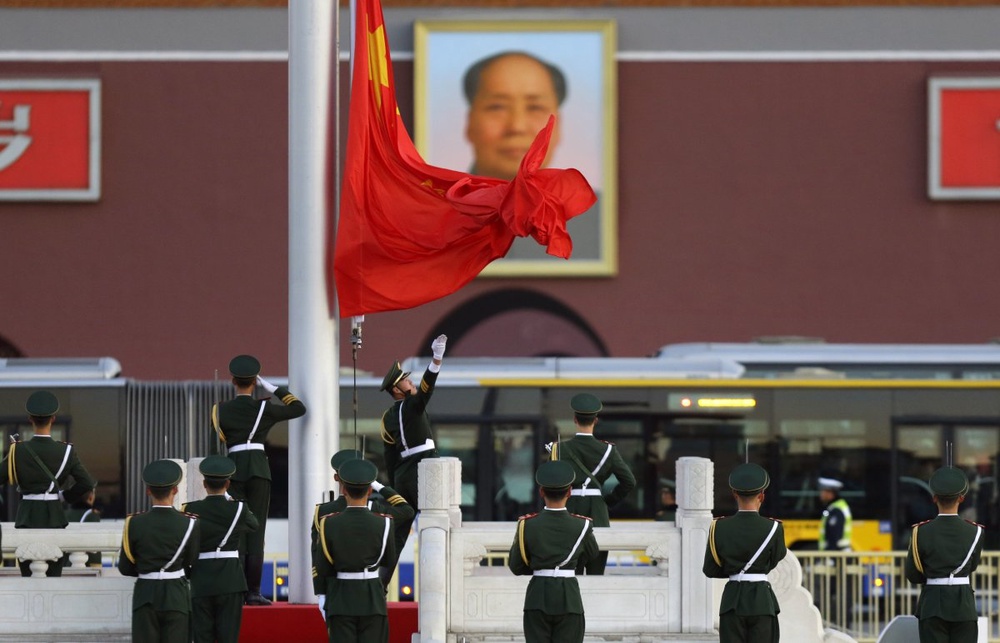
People around the world see China as "confident", "belligerent" and "arrogant", state-run media reported Tuesday in an unusually direct survey of attitudes towards the country, AFP reports. Only 13 percent of respondents in the poll by the Global Times newspaper described China as "peaceful", a sign that Beijing's territorial spats with its Asian neighbours have taken a toll on its image. It also concluded that "the closer you are to China, the more likely you are to have a negative view of it". The Global Times tends to take a nationalistic stance and is close to China's ruling Communist Party. With the exception of rivals such as the US or Japan, state-run media coverage of relations with other countries normally concentrates on the positive, and it is rare for criticism of China to be reported. But in the survey of 14,400 people in 14 countries, 30.3 percent of respondents called China "confident" in international affairs, with 29.4 percent describing it as "belligerent", while "complicated" was chosen by 28.1 percent. "People also describe China with words such as 'tough', 'arrogant' and 'co-operative'," the paper added, with each of them chosen by about 25 percent of respondents. The survey was conducted last month in countries including the United States, Russia, Japan, India, Vietnam, South Korea, South Africa, Britain, the Philippines and Brazil. It did not give details on the methodology of the study, which was carried out by the Global Times Global Poll Center, but described it as "the first political survey conducted by a Chinese media agency on a global scale as the country grows increasingly concerned about its soft power". The paper quoted Swaran Singh of Jawaharlal Nehru University in New Delhi saying the adjectives used "can be seen as elements of any rapidly evolving rising power". "China needs to develop its soft power," it cited Sunjoy Joshi, of India's Observer Research Foundation, as saying. "It needs to be gentle in its conduct of neighbourhood diplomacy. Similarly it must not allow its economic diplomacy to be viewed as neocolonialism or 21st century resource colonisation." China has long been embroiled in disputes with its neighbours, particularly Japan and the Philippines, over territory in the East and South China Seas. Those tensions were ratcheted up last month with China's declaration that it was establishing an air zone over the skies covering part of the East China Sea, a move that prompted a backlash among the US, Japan and South Korea. China's image abroad also suffered a hit last month when it announced it was initially sending only $100,000 in humanitarian relief to the typhoon-hit Philippines. Authorities later increased the amount of aid, but not before a round of criticism. About 25.4 percent of respondents from neighbouring countries said they "like" China, the survey said, compared with 36.0 percent from non-neighbouring countries.





People around the world see China as "confident", "belligerent" and "arrogant", state-run media reported Tuesday in an unusually direct survey of attitudes towards the country, AFP reports.
Only 13 percent of respondents in the poll by the Global Times newspaper described China as "peaceful", a sign that Beijing's territorial spats with its Asian neighbours have taken a toll on its image.
It also concluded that "the closer you are to China, the more likely you are to have a negative view of it".
The Global Times tends to take a nationalistic stance and is close to China's ruling Communist Party.
With the exception of rivals such as the US or Japan, state-run media coverage of relations with other countries normally concentrates on the positive, and it is rare for criticism of China to be reported.
But in the survey of 14,400 people in 14 countries, 30.3 percent of respondents called China "confident" in international affairs, with 29.4 percent describing it as "belligerent", while "complicated" was chosen by 28.1 percent.
"People also describe China with words such as 'tough', 'arrogant' and 'co-operative'," the paper added, with each of them chosen by about 25 percent of respondents.
The survey was conducted last month in countries including the United States, Russia, Japan, India, Vietnam, South Korea, South Africa, Britain, the Philippines and Brazil.
It did not give details on the methodology of the study, which was carried out by the Global Times Global Poll Center, but described it as "the first political survey conducted by a Chinese media agency on a global scale as the country grows increasingly concerned about its soft power".
The paper quoted Swaran Singh of Jawaharlal Nehru University in New Delhi saying the adjectives used "can be seen as elements of any rapidly evolving rising power".
"China needs to develop its soft power," it cited Sunjoy Joshi, of India's Observer Research Foundation, as saying. "It needs to be gentle in its conduct of neighbourhood diplomacy. Similarly it must not allow its economic diplomacy to be viewed as neocolonialism or 21st century resource colonisation."
China has long been embroiled in disputes with its neighbours, particularly Japan and the Philippines, over territory in the East and South China Seas.
Those tensions were ratcheted up last month with China's declaration that it was establishing an air zone over the skies covering part of the East China Sea, a move that prompted a backlash among the US, Japan and South Korea.
China's image abroad also suffered a hit last month when it announced it was initially sending only $100,000 in humanitarian relief to the typhoon-hit Philippines. Authorities later increased the amount of aid, but not before a round of criticism.
About 25.4 percent of respondents from neighbouring countries said they "like" China, the survey said, compared with 36.0 percent from non-neighbouring countries.
USA
Asia Pacific
Brazil
China
CIS
India
Japan
news
Philippines
politics
Russia
South Korea
Survey
Americas

 +7 (777) 001 44 99
+7 (777) 001 44 99















































